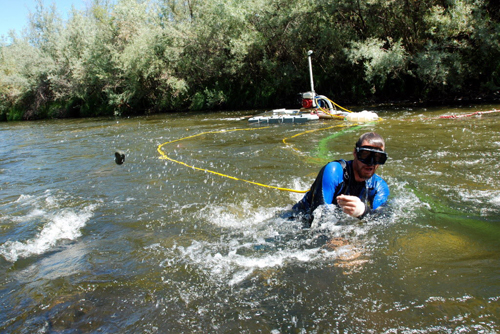 BY SEN. ALAN BATES | OP-ED CONTRIBUTOR
BY SEN. ALAN BATES | OP-ED CONTRIBUTOR
The practice of suction dredge mining has been limited or stopped in Washington, California, Idaho and all federal lands. Yet, suction dredge mining is one of two placer gold mining activities still commonly found in Oregon, often in our state’s most remote and beautiful rivers, and the same watersheds that have historically supported strong salmon and trout fisheries.
 Editor’s note: This column is a response to an April 24th op-ed authored by Sen. Alan Olson (R-Canby).
Editor’s note: This column is a response to an April 24th op-ed authored by Sen. Alan Olson (R-Canby).
BY SEN. ALAN BATES | OP-ED CONTRIBUTOR
Oregon has a long history of caring for our rivers. In 1970, Oregon voters approved a citizens’ initiative that created the Oregon State Scenic Waterways program. The program was last updated in 1988, and has since grown to include protections for 19 of Oregon’s rivers.
Essentially, the Scenic Waterways program allows for the protection of Oregon’s most treasured rivers by preserving water quality at levels necessary for recreation, fish, and wildlife. The program not only preserves our rivers – it also respects private property rights and protects property values.
The practice of suction dredge mining has been limited or stopped in Washington, California, Idaho and all federal lands. Yet, suction dredge mining is one of two placer gold mining activities still commonly found in Oregon, often in our state’s most remote and beautiful rivers, and the same watersheds that have historically supported strong salmon and trout fisheries. The practice includes vacuuming up a river bed in search of gold and other minerals, sucking up rocks and gravel and returning the remaining sediment to the stream bottom.
As you can imagine, this practice has impacts on fish, wildlife, property owners and on our state’s most beautiful rivers. Concerns raised about suction dredge mining in a 2011 California Department of Fish and Game environmental impact report included “significant and unavoidable impacts” on water quality, including mercury and trace discharge from equipment, as well as changes in behavior among small birds during breeding season, noise impacts, and possible demolition or alteration of historical and archaeological resources.
Oregonians consider our peaceful, pristine rivers a legacy to pass on to the next generation. Vacuuming up a river bed with a loud motorized raft is bad for property owners, bad for recreational river users, and bad for fish and wildlife. It’s just common sense that we would protect our rivers from harm.
Current legislation under consideration in the Oregon Legislature would protect our rivers by studying more miles of river and potentially including them in the State Scenic Waterways Act, limiting suction-dredge mining in Oregon, and revisiting regulations and fees for miners.
Oregon is blessed with a diversity of river systems that contribute greatly to our quality of life. Wise stewardship of our state’s natural resources becomes increasingly important as the population and development grows along our rivers. Oregon should protect the natural resources that promote healthy communities and enrich the lives of Oregonians.
Sen. Alan Bates (D-Medford) is vice-chairman of the Oregon State Senate Committee for Environment and Natural Resources.
Editor’s Note: Oregon Business accepts opinion pieces on topics relevant to the state’s business community. See Op-Ed submission guidelines here.


 BY SEN. ALAN BATES | OP-ED CONTRIBUTOR
BY SEN. ALAN BATES | OP-ED CONTRIBUTOR